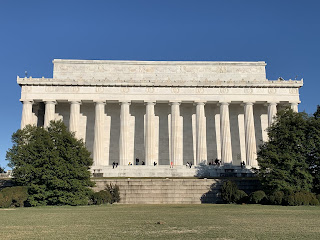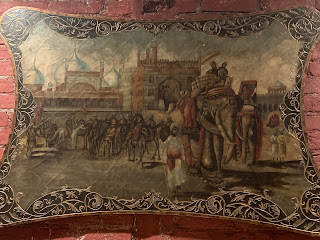Rolling Thunder, the Vietnam War, and Memorial Day
This year, for the first time ever on a Memorial Day weekend, I didn’t hear the “vroom vroom vroom” of Rolling Thunder motor bikes, the sight and sound of them rippling across Constituion Avenue like shockwaves!
It’s a Washington, D.C. annual gathering that started more than 30 years ago, organized by Vietnam War veterans to raise awareness and demand accountability for prisoners of war (POWs) and soldiers missing in action (MIAs) in the Vietnam War.
It’s a Washington, D.C. annual gathering that started more than 30 years ago, organized by Vietnam War veterans to raise awareness and demand accountability for prisoners of war (POWs) and soldiers missing in action (MIAs) in the Vietnam War.
Riders Rally
Riders from around the nation (and the world) would rally at the Pentagon and ride a designated route through the capital city’s distinctive Mall area. It was a venue for veterans to meet, pay their respects at the war memorials, and participate in Memorial Day events to honor and mourn the dead.
If you’ve never heard or seen these bikers, it’s quite an experience to drive alongside them on the Beltway or in the city. They are mostly seniors with long gray “hippie” hair, flowing beards and scarves, often wearing camouflage gear with faces and arms covered in tats!
Some riders are, surprisingly, women although women usually ride pillion. The unspoken protocol is for car drivers to respectfully get out of the way and let them ride past. It’s also an opportunity to admire their decorated bikes up close: Harley-Davidsons, Royal Enfields, Triumphs, Yamahas, Kawasakis, BMWs, and more.
Some riders are, surprisingly, women although women usually ride pillion. The unspoken protocol is for car drivers to respectfully get out of the way and let them ride past. It’s also an opportunity to admire their decorated bikes up close: Harley-Davidsons, Royal Enfields, Triumphs, Yamahas, Kawasakis, BMWs, and more.
I used to hear them from inside my flat despite the soundproofed windows and had the best views from my balcony. Residents on my street would wave and cheer and sometimes salute, rather awkwardly!
POW/MIA Cause
In 1987, Marine Corporal Ray Manzo, a Vietnam veteran, visited D.C. to meet and enlist fellow vets. The goal was to organize a motorcycle demonstration to bring attention to the POW/MIA issue. Choosing Memorial Day weekend for the event, they figured that the arrival of bikes driving across Memorial Bridge would sound like rolling thunder, hence the name.
The first run in 1988 had about 2,500 bikes and pillion riders. It continued to grow every year, becoming the world’s largest single-day motorcycle event. With over a million riders and spectators last year, Rolling Thunder had evolved into a patriotic display for all who served, with Iraq and Afghan veterans joining in. Until this year!
Say it ain’t so!
The tradition ended, according to press reports, because of “escalating costs and a lack of cooperation” from the Pentagon and metropolitan police departments. Organizers announced that 2019 would be the final D.C. ride, citing the $200K price tag, conflicts with Pentagon management over logistics and fees, and their own “advancing ages” as the main reasons for ending the tradition. A pity! Really! It was one of the more colorful and entertaining traditions! Say it ain’t so!
The tradition ended, according to press reports, because of “escalating costs and a lack of cooperation” from the Pentagon and metropolitan police departments. Organizers announced that 2019 would be the final D.C. ride, citing the $200K price tag, conflicts with Pentagon management over logistics and fees, and their own “advancing ages” as the main reasons for ending the tradition. A pity! Really! It was one of the more colorful and entertaining traditions! Say it ain’t so!
Not a Parade, not a Party!
I was writing a newspaper feature some years ago and asked a biker vet if he enjoyed cruising down D.C. avenues sans traffic! His stern response was “It’s not a parade. It’s not a party... it’s a protest of our failings; as a country, we must own those failings.” (Quotes are from my interview). Besides troops still missing in action from overseas conflicts, the focus, he added sadly, was now on the mental health/suicide crisis which claims 20 veteran lives a day and disproportionately seems to affect returnees from Vietnam.
The annual ride used to draw ever-larger crowds to the D.C. streets and with it a host of security and planning headaches. A more abbreviated event called “Rolling to Remember” was supposed to be held this year at the Lincoln Memorial. With the ongoing coronavirus crisis, I’m not sure if it took place.
And the Band Played Waltzing Matilda
MSNBC TV host Lawrence O’Donnell ended his May 25 (Memorial Day) broadcast with an emotional look back at members of his own family who’d died in wars and played a video of Vietnam War vet, amputee, and Medal of Honor recipient, Bob Kerrey (also former senator, Nebraska governor, and 1992 presidential candidate) who sang “And the Band Played Waltzing Matilda” about the futility and horrors of war. The video is from 1988 when Kerrey was elected to the U.S. Senate. (I circulated it earlier but worth a second look. See below).
Written in the 1970s by Eric Bogle, an Australian folk musician, this anti-war song describes a young Aussie who lost both legs at the Battle of Gallipolli (1915, World War I) after the ANZACs (Australian and New Zealand Army Corps) were outnumbered and crushed by the far better prepared “Johnny Turks” (Ottoman/Turkish soldiers). The song also describes the apathy of young bystanders back home who wondered why these old soldiers were marching with their medals.
Written in the 1970s by Eric Bogle, an Australian folk musician, this anti-war song describes a young Aussie who lost both legs at the Battle of Gallipolli (1915, World War I) after the ANZACs (Australian and New Zealand Army Corps) were outnumbered and crushed by the far better prepared “Johnny Turks” (Ottoman/Turkish soldiers). The song also describes the apathy of young bystanders back home who wondered why these old soldiers were marching with their medals.
Yes, military bands sang it better than Kerrey (as some of you pointed out; there are many versions on YouTube!) but those are usually trained or professional singers. It resonates more, in my view, when a decorated war hero amputee (from Vietnam) sings rather unexpectedly at a political gathering about a faraway and mostly forgotten war (Gallipolli).
The Draft (Conscription)
Rolling Thunder was also the name of the longest sustained aerial bombing campaign in U.S. history that was pursued during the Vietnam War. It was eventually deemed a failure because it failed to destroy the North Vietnamese or their ability to keep fighting in South Vietnam.
Despite the passage of time, the costly and divisive Vietnam War remains a raw wound in the minds of many Americans for several reasons: the compulsory enlistment, the deaths, and because the U.S. lost. In the 60s and 70s, a federal draft compelled young men to join the armed forces. As a result, they often lost their lives and limbs (and sometimes their minds) for what was viewed as an unjust cause on the other side of the world! Many more unjust wars may have been fought by the U.S. after Vietnam - but without the draft; it’s now an all volunteer army.
Interestingly, some leaders have called for the reinstatement of the draft because poor Whites, minorities and immigrants make up the bulk of those who join the armed forces, both in the present and during the Vietnam era when wealthy parents got deferments for their sons or sent them to Canada. Racial and economic inequality in opportunity, wages, housing, healthcare, and education (socioeconomic restratification) has meant that few well-off Americans serve, even now!
Blood and Treasure
A personal note and the reason for my interest: I worked as an information officer at the New Zealand High Commission in New Delhi many years ago. I began in the library which had dozens of books on the ANZAC campaign and the Battle of Gallipolli which I read avidly! More recently, I visited ANZAC memorials at Gallipolli in Turkey and, to bring this discussion full circle, the site of the former U.S. Embassy in Saigon (now Ho Chi Minh City). As a student of history, I find battlefields evocative but Gallipolli was especially moving.
On this Memorial Day weekend, it is sobering to reflect on the cost of war in terms of loss: “blood and treasure” (lives and money).
A personal note and the reason for my interest: I worked as an information officer at the New Zealand High Commission in New Delhi many years ago. I began in the library which had dozens of books on the ANZAC campaign and the Battle of Gallipolli which I read avidly! More recently, I visited ANZAC memorials at Gallipolli in Turkey and, to bring this discussion full circle, the site of the former U.S. Embassy in Saigon (now Ho Chi Minh City). As a student of history, I find battlefields evocative but Gallipolli was especially moving.
On this Memorial Day weekend, it is sobering to reflect on the cost of war in terms of loss: “blood and treasure” (lives and money).
Ludi Joseph
Washington, D.C.
May 26, 2020
NB: Except for the last two, the other pictures below are mine.
NB: Except for the last two, the other pictures below are mine.

















